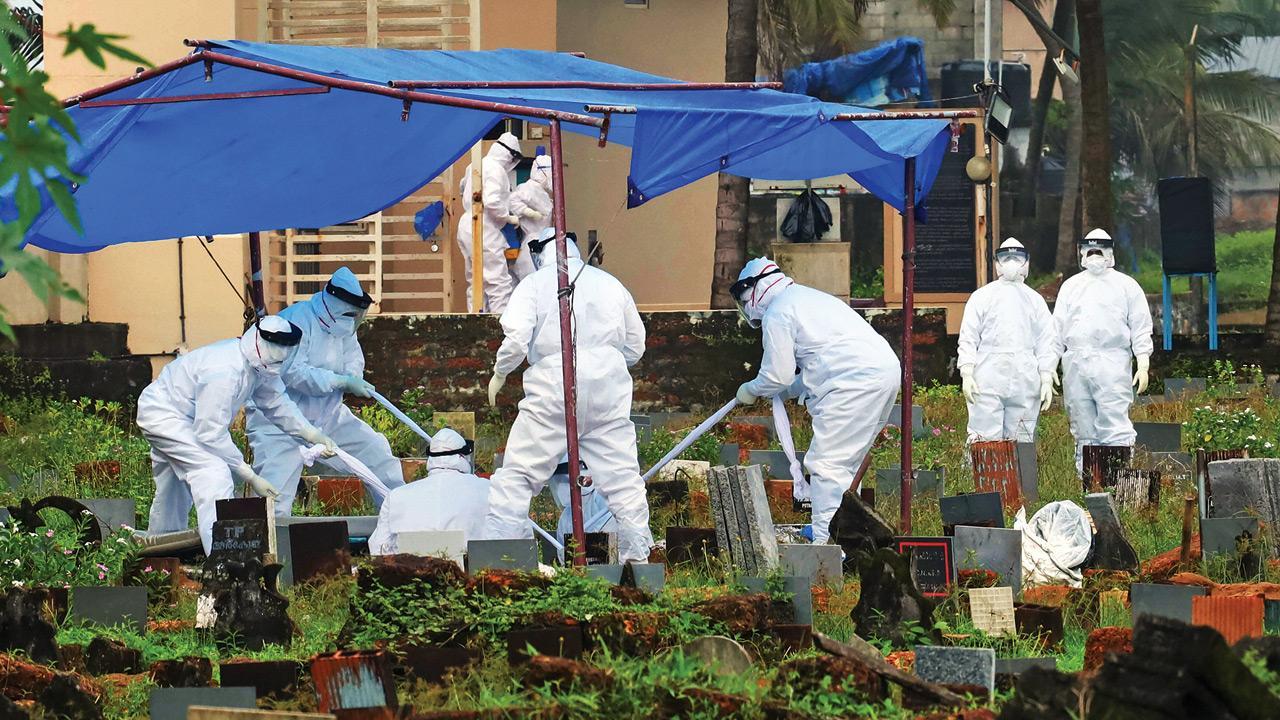Experts say an outbreak of the virus, which has claimed a boy’s life in Kerala, in the country would be disastrous, with COVID-19 already causing havoc

Health workers bury the body of the 12-year-old Nipah virus victim in Kozhikode on September 5. Pic/PTI
Health care experts are concerned about the double blow that Kerala is facing. Even as the state tops in Covid-19 numbers across the country, the Nipah virus claimed the life of a 12-year-old from Kozhikode and over 188 are under observation, after two health care workers testing positive and were in contact with those under observation. They said it is time for Mumbai and Maharashtra, to be alert, especially with the coming festivals.
Dr Wiqar Shaikh, professor of Medicine, Grant Medical College and Sir J.J. Group of Hospitals has said that the Nipah Virus (NiV) was first discovered in 1999 following an outbreak of the disease in pigs and human beings in Malaysia and Singapore, resulting in 300 human cases and more than 100 deaths. At least 1 million pigs were then killed to help control the outbreak. Since then, NiV outbreaks have been recorded annually in Bangladesh and India. The first case of NiV was detected in Siliguri in 2001, when 45 people died due to the outbreak.
Bats, again!
Dr Shaikh added that NiV is a zoonotic virus, which means that it spreads from animals to human beings. Fruit bats can spread NiV to pigs and then to human beings through pig saliva or urine. NiV could also be transferred to human beings through infected fruits. He said that the symptoms of NiV could be mild to severe and in outbreaks between 1988 and 2018, deaths occurred in 40% to 70% of those infected, as compared to less than 5 per cent deaths in Covid, which show that Nipah is more virulent.
No treatment available
Dr Shaikh explained that the symptoms of NiV appear within two weeks following exposure to the virus. “Common symptoms include fever, headache, cough, sore throat, vomiting and difficulty in breathing. Severe symptoms may follow, such as disorientation, confusion, fits and coma. There may be long-term effects in survivors such as persistent fits and personality changes,” he said. Dr Shaikh also added that like Covid-19, NiV is also diagnosed through its specific RT-PCR swab test. Unfortunately, there is no specific treatment for NiV and indeed treatment is limited to supportive care, symptomatic treatment, rest and hydration.
Dr Shaikh said that the samples from the boy who died in Kozhikode last week, were sent to the National Institute of Virology in Pune. Since then two health workers have developed symptom s of NiV and 188 contacts of the boy are being investigated. Dr Shaikh concluded, “Health authorities across India especially in Mumbai and Maharashtra, as the oncoming festive seasons, need to be vigilant and alert to prevent an outbreak of NiV in the country, city and state which would be disastrous, with Covid already causing havoc.”
Similar prevention measures
The prevention measures for Nipah are the same as that for Covid and include hand washing and wearing masks. Dr Ketan Vagholkar, professor of Surgery at D Y Patil Medical College, said “Close contact with an infected person can also cause Nipah. Diagnosis, is by RT-PCR testing with throat and nasal swabs, urine, and blood. Treatment is supportive in nature comprising rest, hydration, and symptomatic treatment. There is no specific drug to treat this viral disease. The therapeutic efficacy of drugs such as remdesivir, ribavirin and monoclonal antibodies is yet to be proven. There is no vaccine available. Prevention is by regular hand washing and strict avoidance of contact with infected individuals, their body fluids and infected animals.”
“Nipah can also cause encephalitis. Approximately 20% of patients are reported to have neurological consequences such as seizure disorder and personality changes,” said Dr Santosh Bansode, head of the department, Emergency Medicine, Wockhardt Hospital, Mumbai Central.
“There are currently no studies on viral persistence in bodily fluids or the environment including fruits. Human to human transmission of Nipah virus is noted among family and caregivers of infected patients. The interval from infection to the onset of symptoms is believed to be from 4 to 14 days. However, this period of 45 days is also reported in some cases. Case fatality rate is 40% to 75%,” said Dr Bansode.
 Subscribe today by clicking the link and stay updated with the latest news!" Click here!
Subscribe today by clicking the link and stay updated with the latest news!" Click here!









